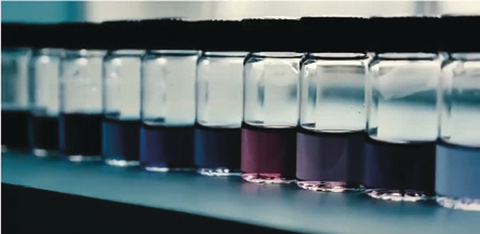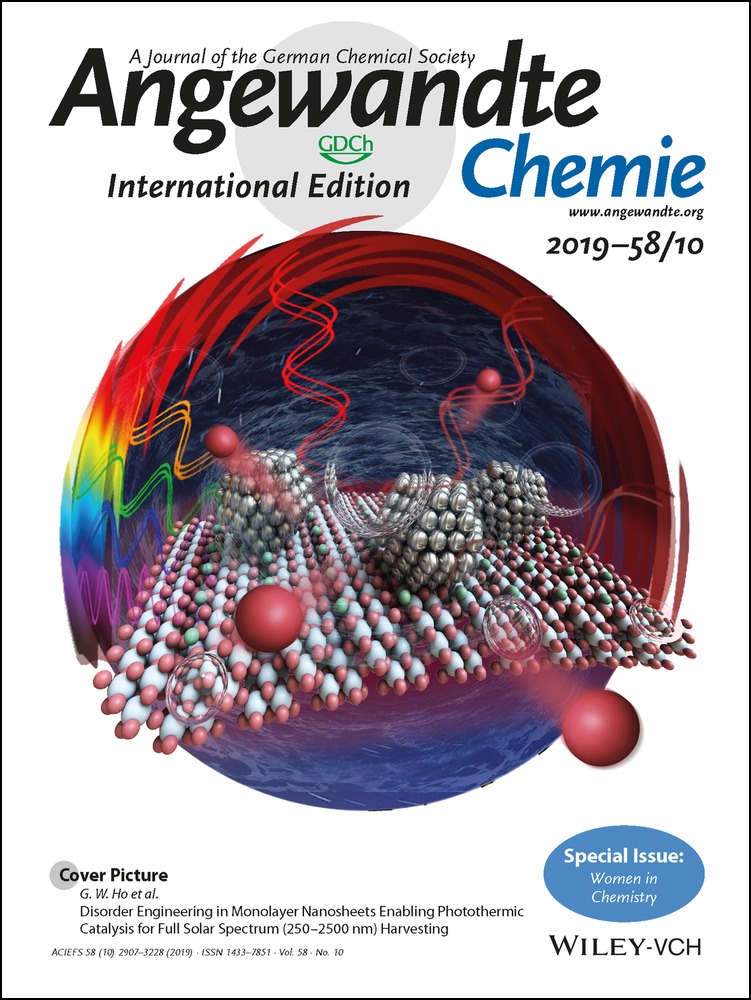Synthesis of Plasmonic Group-4 Nitride Nanocrystals by Solid-State Metathesis
Correction(s) for this article
-
Corrigendum: Synthesis of Plasmonic Group-4 Nitride Nanocrystals by Solid-State Metathesis
- Volume 58Issue 49Angewandte Chemie International Edition
- pages: 17502-17502
- First Published online: November 25, 2019
Reem A. Karaballi
Chemistry Department, Dalhousie University, 6274 Coburg Road, Halifax, Nova Scotia, Canada
Search for more papers by this authorGovinda Humagain
Chemistry Department, Dalhousie University, 6274 Coburg Road, Halifax, Nova Scotia, Canada
Search for more papers by this authorBenjamin R. A. Fleischman
Chemistry Department, Dalhousie University, 6274 Coburg Road, Halifax, Nova Scotia, Canada
Search for more papers by this authorCorresponding Author
Prof. Mita Dasog
Chemistry Department, Dalhousie University, 6274 Coburg Road, Halifax, Nova Scotia, Canada
Search for more papers by this authorReem A. Karaballi
Chemistry Department, Dalhousie University, 6274 Coburg Road, Halifax, Nova Scotia, Canada
Search for more papers by this authorGovinda Humagain
Chemistry Department, Dalhousie University, 6274 Coburg Road, Halifax, Nova Scotia, Canada
Search for more papers by this authorBenjamin R. A. Fleischman
Chemistry Department, Dalhousie University, 6274 Coburg Road, Halifax, Nova Scotia, Canada
Search for more papers by this authorCorresponding Author
Prof. Mita Dasog
Chemistry Department, Dalhousie University, 6274 Coburg Road, Halifax, Nova Scotia, Canada
Search for more papers by this authorGraphical Abstract
Ready to plassemble: The synthesis of TiN, ZrN, and HfN nanocrystals using solid-state metathesis is reported. The nanocrystals, which are dispersible in water, show localized surface plasmonic resonances in the near infrared (TiN) and visible region (ZrN, HfN) of light. This makes them ideal for applications like photothermal therapy or plasmon-enhanced sensing.
Abstract
Ceramic nanoparticles that exhibit a plasmonic response are promising next-generation photonic materials. In this contribution, a solid-state metathesis method has been reported for the synthesis of Group 4 nitride (TiN, ZrN, and HfN) nanocrystals. A high-temperature (1000 °C) reaction between Group 4 metal oxide (TiO2, ZrO2, and HfO2) nanoparticles and magnesium nitride powder yielded nitride nanocrystals that were dispersible in water. A localized surface plasmonic resonance was observed in the near-infrared region for TiN and in the visible region of light for ZrN and HfN nanocrystals. The frequency of the plasmon resonance was dependent on the refractive index of the solvent and the nanocrystal size.
Supporting Information
As a service to our authors and readers, this journal provides supporting information supplied by the authors. Such materials are peer reviewed and may be re-organized for online delivery, but are not copy-edited or typeset. Technical support issues arising from supporting information (other than missing files) should be addressed to the authors.
| Filename | Description |
|---|---|
| anie201813134-sup-0001-misc_information.pdf1.2 MB | Supplementary |
Please note: The publisher is not responsible for the content or functionality of any supporting information supplied by the authors. Any queries (other than missing content) should be directed to the corresponding author for the article.
References
- 1D. B. Li, X. J. Sun, Y. P. Jia, M. I. Stockman, H. P. Paudel, H. Song, H. Jiang, Z. M. Li, Light: Sci. Appl. 2017, 6, e 17038.
- 2N. Jiang, X. Zhuo, J. Wang, Chem. Rev. 2018, 118, 3054–3099.
- 3M. I. Stockman, K. Kneipp, S. I. Bozhevolnyi, S. S. A. Datta, J. Opt. 2018, 20, 043001.
- 4A. Comin, L. Manna, Chem. Soc. Rev. 2014, 43, 3957–3975.
- 5S. Carretero-Palacios, A. Jiménez-Solano, H. Míguez, ACS Energy Lett. 2016, 1, 323–331.
- 6V. E. Ferry, L. A. Sweatlock, D. Pacifici, H. A. Atwater, Nano Lett. 2008, 8, 4391–4397.
- 7N. Zhou, V. López-Puente, Q. Wang, L. Polavarapu, I. Pastoriza-Santos, Q. H. Xu, RSC Adv. 2015, 5, 29076–29097.
- 8Y. Zhang, Z. Sun, S. Cheng, F. Yan, ChemSusChem 2016, 9, 813–819.
- 9D. Jaque, L. Martínez Maestro, B. Del Rosal, P. Haro-Gonzalez, A. Benayas, J. L. Plaza, E. Martín Rodríguez, J. García Solé, Nanoscale 2014, 6, 9494–9530.
- 10H. Norouzi, K. Khoshgard, F. Akbarzadeh, Lasers Med. Sci. 2018, 33, 917–926.
- 11S. Wang, P. Huang, L. Nie, R. Xing, D. Liu, Z. Wang, J. Lin, S. Chen, G. Niu, G. Lu, et al., Adv. Mater. 2013, 25, 3055–3061.
- 12B. Schwarz, P. Reininger, H. Detz, T. Zederbauer, A. M. Andrews, W. Schrenk, G. Strasser, Nat. Commun. 2014, 5, 4085.
- 13D. Ansell, I. P. Radko, Z. Han, F. J. Rodriguez, S. I. Bozhevolnyi, A. N. Grigorenko, Nat. Commun. 2015, 6, 8846.
- 14D. C. Look, K. D. Leedy, Appl. Phys. Lett. 2013, 102, 182107.
- 15M. E. Stewart, C. R. Anderton, L. B. Thompson, J. Maria, S. K. Gray, J. A. Rogers, R. G. Nuzzo, Chem. Rev. 2008, 108, 494–521.
- 16M. Li, S. K. Cushing, N. Wu, Analyst 2015, 140, 386–406.
- 17M. Mesch, B. Metzger, M. Hentschel, H. Giessen, Nano Lett. 2016, 16, 3155–3159.
- 18A. B. Taylor, P. Zijlstra, ACS Sens. 2017, 2, 1103–1122.
- 19P. D. Howes, S. Rana, M. M. Stevens, Chem. Soc. Rev. 2014, 43, 3835–3853.
- 20M. Mansuripur, A. R. Zakharian, A. Lesuffleur, S. Oh, R. J. Jones, N. C. Lindquist, H. Im, A. Kobyakov, J. V. Moloney, Opt. Express 2009, 17, 14001–14014.
- 21Y. Cui, I. Y. Phang, R. S. Hegde, Y. H. Lee, X. Y. Ling, ACS Photonics 2014, 1, 631–637.
- 22S. Fu, X. Zhang, Q. Han, S. Liu, X. Han, Y. Liu, Sci. Rep. 2016, 6, 36701.
- 23H. Kang, J. T. Buchman, R. S. Rodriguez, H. L. Ring, J. He, K. C. Bantz, C. L. Haynes, Chem. Rev. 2019, 1, 664–699.
- 24G. H. Chan, J. Zhao, E. M. Hicks, G. C. Schatz, R. P. Van Duyne, Nano Lett. 2007, 7, 1947–1952.
- 25M. L. Tseng, J. Yang, M. Semmlinger, C. Zhang, P. Nordlander, N. J. Halas, Nano Lett. 2017, 17, 6034–6039.
- 26M. W. Knight, N. S. King, L. Liu, H. O. Everitt, P. Nordlander, N. J. Halas, ACS Nano 2014, 8, 834–840.
- 27J. S. Biggins, S. Yazdi, E. Ringe, Nano Lett. 2018, 18, 3752–3758.
- 28S. Kim, J. M. Kim, J. E. Park, J. M. Nam, Adv. Mater. 2018, 30, 1704528.
- 29G. V. Naik, V. M. Shalaev, A. Boltasseva, Adv. Mater. 2013, 25, 3264–3294.
- 30W. T. Hsieh, P. C. Wu, J. B. Khurgin, D. P. Tsai, N. Liu, G. Sun, ACS Photonics 2018, 5, 2541–2548.
- 31A. Lalisse, G. Tessier, J. Plain, G. Baffou, Sci. Rep. 2016, 6, 38647.
- 32M. Kumar, S. Ishii, N. Umezawa, T. Nagao, Opt. Mater. Express 2015, 6, 246025.
- 33P. Patsalas, N. Kalfagiannis, S. Kassavetis, Materials 2015, 8, 3128–3154.
- 34U. Guler, V. M. Shalaev, A. Boltasseva, Mater. Today 2015, 18, 227–237.
- 35M. Kumar, N. Umezawa, S. Ishii, T. Nagao, ACS Photonics 2016, 3, 43–50.
- 36Y. Wang, A. Capretti, L. Dal Negro, Opt. Mater. Express 2015, 5, 2415.
- 37G. V. Naik, J. Kim, A. Boltasseva, Opt. Mater. Express 2011, 1, 1090–1099.
- 38A. Reinholdt, R. Pecenka, A. Pinchuk, S. Runte, A. L. Stepanov, T. E. Weirich, U. Kreibig, Eur. Phys. J. D 2004, 31, 69–76.
- 39S. Exarhos, A. Alvarez-Barragan, E. Aytan, A. A. Balandin, L. Mangolini, ACS Energy Lett. 2018, 3, 2349–2356.
- 40K. S. Schramke, Y. Qin, J. T. Held, K. A. Mkhoyan, U. R. Kortshagen, ACS Appl. Nano Mater. 2018, 1, 2869–2876.
- 41A. Alvarez Barragan, N. V. Ilawe, L. Zhong, B. M. Wong, L. Mangolini, J. Phys. Chem. C 2017, 121, 2316–2322.
- 42U. Guler, J. C. Ndukaife, G. V. Naik, A. G. A. Nnanna, A. V. Kildishev, V. M. Shalaev, A. Boltasseva, Nano Lett. 2013, 13, 6078–6083.
- 43R. Xu, W. Pang, Q. Huo, Modern Inorganic Synthetic Chemistry, Elsevier, Amsterdam, 2011.
10.1016/B978-0-444-53599-3.10002-2 Google Scholar
- 44A. W. Weimer, Carbide, Nitride and Boride Materials Synthesis and Processing, Springer, Heidelberg, 1997.
10.1007/978-94-009-0071-4 Google Scholar
- 45S. Kaskel, K. Schlichte, G. Chaplais, M. Khanna, J. Mater. Chem. 2003, 13, 1496–1499.
- 46E. G. Gillan, R. B. Kaner, Inorg. Chem. 1994, 33, 5693–5700.
- 47R. A. Janes, M. Aldissi, R. B. Kaner, Chem. Mater. 2003, 15, 4431–4435.
- 48D. O. Thorsteinsson, J. T. Gudmundsson, AIP Adv. 2018, 8, 035124.
- 49I. P. Parkin, A. M. Nartowski, Polyhedron 1998, 17, 2617–2622.
- 50M. D. Aguas, A. M. Nartowski, I. P. Parkin, M. MacKenzie, A. J. Craven, J. Mater. Chem. 1998, 8, 1875–1880.
- 51B. Mazumder, A. L. Hector, J. Mater. Chem. 2008, 18, 1392–1398.
- 52B. Mazumder, A. L. Hector, J. Mater. Chem. 2009, 19, 4673–4686.
- 53P. Yang, D. Chao, C. Zhu, X. Xia, Y. Zhang, X. Wang, P. Sun, B. K. Tay, Z. X. Shen, W. J. Mai, et al., Adv. Sci. 2016, 3, 1500299.
- 54Q. Zhou, J. Zhai, AIP Adv. 2013, 3, 032102.
- 55K. L. Kelly, E. Coronado, L. L. Zhao, G. C. Schatz, J. Phys. Chem. B 2003, 107, 668–677.
- 56S. Ishii, R. P. Sugavaneshwar, T. Nagao, J. Phys. Chem. C 2016, 120, 2343–2348.
- 57W. He, K. Ai, C. Jiang, Y. Li, X. Song, L. Lu, Biomaterials 2017, 132, 37–47.
- 58D. Harris, Quantitative Chemical Analysis, W. H. Freeman, New York, 2007.
- 59J. J. Mock, D. R. Smith, S. Schultz, Nano Lett. 2003, 3, 485–491.
- 60C. Novo, A. M. Funston, I. Pastoriza-Santos, L. M. Liz-Marzán, P. Mulvaney, J. Phys. Chem. C 2008, 112, 3–7.





